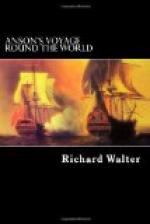This mandarin appeared to be a person of very considerable parts, and endowed with more frankness and honesty than is to be found in the generality of the Chinese. After the proper inquiries had been made, particularly about the leak, which the Chinese carpenters reported to be as dangerous as it had been represented, and consequently that it was impossible for the Centurion to proceed to sea without being refitted, the mandarin expressed himself satisfied with the account given in the Commodore’s letter. And this magistrate, as he was more intelligent than any other person of his nation that came to our knowledge, so likewise was he more curious and inquisitive, viewing each part of the ship with particular attention, and appearing greatly surprised at the largeness of the lower-deck guns, and at the weight and size of the shot. The Commodore observing his astonishment thought this a proper opportunity to convince the Chinese of the prudence of granting him a speedy and ample supply of all he wanted. With this view he told the mandarin and those who were with him, that besides the demands he made for a general supply, he had a particular complaint against the proceedings of the custom-house of Macao; that at his first arrival the Chinese boats had brought on board plenty of greens and variety of fresh provisions for daily use, for which they had always been paid to their full satisfaction, but that the custom-house officers at Macao had soon forbid them, by which means he was deprived of those refreshments which were of the utmost consequence to the health of his men after their long and sickly voyage; that as they, the mandarins, had informed themselves of his wants, and were eye-witnesses of the force and strength of his ship, they might be satisfied it was not for want of power to supply imself that he desired the permission of the Government to purchase what provisions he stood in need of; that they must be convinced that the Centurion alone was capable of destroying the whole navigation of the port of Canton, or of any other port in China, without running the least risk from all the force the Chinese could collect; that it was true this was not the manner of proceeding between nations in friendship with each other, but it was likewise true that it was not customary for any nation to permit the ships of their friends to starve and sink in their ports, when those friends had money to supply their wants and only desired liberty to lay it out; that they must confess he and his people had




